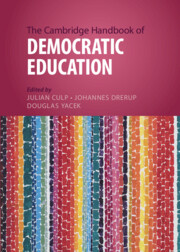Book contents
- The Cambridge Handbook of Democratic Education
- Cambridge Handbooks in Education
- The Cambridge Handbook of Democratic Education
- Copyright page
- Contents
- Contributors
- Acknowledgments
- Introduction
- Part One Historical Perspectives
- Part Two Philosophical and Normative Foundations
- Part Three Key Topics and Concepts
- Part Four Challenges
- 26 Wealth Stratification in US Higher Education and Democratic Education, 1890s–2020s
- 27 Mentoring and Instructional Duties of Professors
- 28 Racism, Moral Transformation, and Democratic Education
- 29 Postcolonial Perspectives on Democratic Education
- 30 Populist Challenges to Democratic Education
- 31 Religion and Democratic Education
- 32 The Epistocratic Challenge to Democratic Education
- 33 Climate Change and Democratic Education
- 34 The COVID-19 Pandemic and Democratic Education
- 35 Teacher Neutrality, Pedagogical Impartiality, and Democratic Education
- Index
- References
28 - Racism, Moral Transformation, and Democratic Education
from Part Four - Challenges
Published online by Cambridge University Press: 20 April 2023
- The Cambridge Handbook of Democratic Education
- Cambridge Handbooks in Education
- The Cambridge Handbook of Democratic Education
- Copyright page
- Contents
- Contributors
- Acknowledgments
- Introduction
- Part One Historical Perspectives
- Part Two Philosophical and Normative Foundations
- Part Three Key Topics and Concepts
- Part Four Challenges
- 26 Wealth Stratification in US Higher Education and Democratic Education, 1890s–2020s
- 27 Mentoring and Instructional Duties of Professors
- 28 Racism, Moral Transformation, and Democratic Education
- 29 Postcolonial Perspectives on Democratic Education
- 30 Populist Challenges to Democratic Education
- 31 Religion and Democratic Education
- 32 The Epistocratic Challenge to Democratic Education
- 33 Climate Change and Democratic Education
- 34 The COVID-19 Pandemic and Democratic Education
- 35 Teacher Neutrality, Pedagogical Impartiality, and Democratic Education
- Index
- References
Summary
In this chapter, I analyze the moral transformation of Derek Black in order to acquire insights into the capacities exercised by his friends in helping him overcome his racist ideology – capacities that democratic education should foster in students. Black grew up in the white nationalist movement, but then later repudiated it after college, citing the influence of close friends as a major factor. Analysis of this case suggests that Black’s college friends possessed at least two major sets of capacities, the first concerning friendship and the other regarding the promotion of truth and justice. Efforts aimed at democratic education that aspire to address racism would do well to incorporate the development of these two capacities among their objectives.
- Type
- Chapter
- Information
- The Cambridge Handbook of Democratic Education , pp. 474 - 493Publisher: Cambridge University PressPrint publication year: 2023

